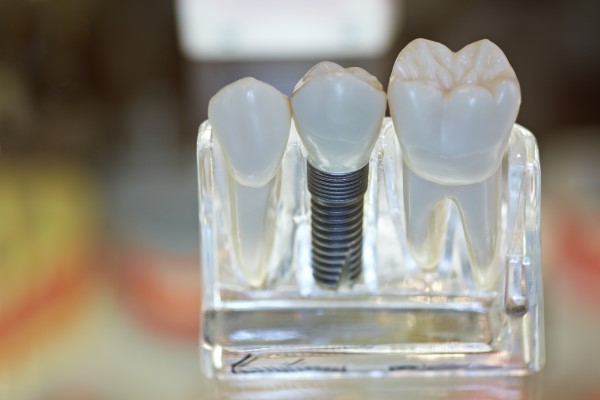Dental Implant Restoration: How an Artificial Root Fuses to the Jawbone

Dental implants offer a permanent and effective way to replace lost teeth. Implants have become increasingly popular as an alternative to various tooth replacement options such as removable dentures. If you are self-conscious because you have one or more missing teeth, you should consider implant treatment. This option may also be ideal if you wear dentures that are uncomfortable.
Dental implants and osseointegration
Most dental implants have three parts, namely the implant body, an attachment called an abutment, and a crown. The implant body is surgically inserted into the bone and a dental crown is fixed to the abutment. Dental implants are usually made of titanium. This metal is often compatible with body tissues. The success of dental implants is highly dependent on a biological process known as osseointegration.
Osseointegration
Once an implant is inserted into the jaw, it needs to be given time to heal before the placement of a crown. This healing usually takes several months. During this period, the surface of the implant fuses with the surrounding bone. This process is commonly referred to as osseointegration. The implant is made strong and secure when the bone grows around it and holds it firmly in place.
Some patients usually have to wait for several months for the implant to integrate completely. Once the process is complete, the implant will be strong enough to support an artificial replacement tooth. During the healing period, the patient will be on a soft diet for the first couple of weeks. This will help ensure the implant heals properly. If necessary, the dentist may place a temporary tooth during this period.
Once the implant fuses or bonds with the jawbone, an abutment will be placed on the implant. Sometimes, the abutment is often placed at the same time as the implant. After the gums heal, the dentist will custom-make a crown. The crown will then be attached to the abutment.
Failed implant
If osseointegration does not happen the right way, it can lead to problems. When bone does not grow properly around the dental implant, one of the signs is mobility. Other signs of an implant that has lost osseointegration may include infection, swelling, or pain. The chances of dental implant failure are very high if a person is diagnosed with an autoimmune disease or certain conditions. These include rheumatoid arthritis and diabetes.
These conditions can cause the body to heal at a slower pace. This is a problem because slow healing usually prevents osseointegration. The use of particular medications can also lead to implant failure. Some medications reduce new bone growth, which will affect the way the implant fuses with the bone. The dental provider should be informed of any medications a person is taking.
Takeaway
Getting dental implants is a good decision for people who have missing teeth. Osseointegration is an important process that helps to make the implant secure and stable. But in some cases, the procedure may not work. However, you should not panic. Your dentist will be able to resolve the problem. But before implant placement, it is important to talk to your dentist about any risk factors that may limit the success of your dental implant.
Are you considering dental implants in the New Albany area? Get more information at https://riverfallsfamilydental.com.
Check out what others are saying about our dental services on Yelp: Dental Implants in New Albany, IN.
Related Posts
Dental implants are a permanent, functional solution for patients with tooth loss in one or both dental arches. Both partial and full arch dental implants have become more accessible, customizable, and successful for a wide range of patients. However, they have different uses and candidacy requirements. Understanding the differences between these options helps clarify which…
A dental implant is widely considered the tooth replacement solution that most closely resembles a natural tooth in durability, functionality, and appearance. However, like natural teeth, dental implants require diligent and consistent care to ensure longevity. Incorporating proper dental implant care into your oral hygiene routine can prevent complications and keep your smile healthy for…
Wondering about dental implants? Read on to learn more. If you have experienced tooth loss and are exploring potential replacement options, then you have probably heard about dental implants. Dentists and patients are turning to tooth implants because it is provenly effective for replacing missing teeth. However, there are different implants, each of which is…
Curious about dental implants? Read on to learn more. Dental implants have positively changed smile reconstruction, providing patients with missing teeth with an effective solution. Implants are a natural-looking and long-lasting alternative to conventional dentures and bridges. This article explains the impact of dental implants on smile reconstruction and oral health, including how they restore…
